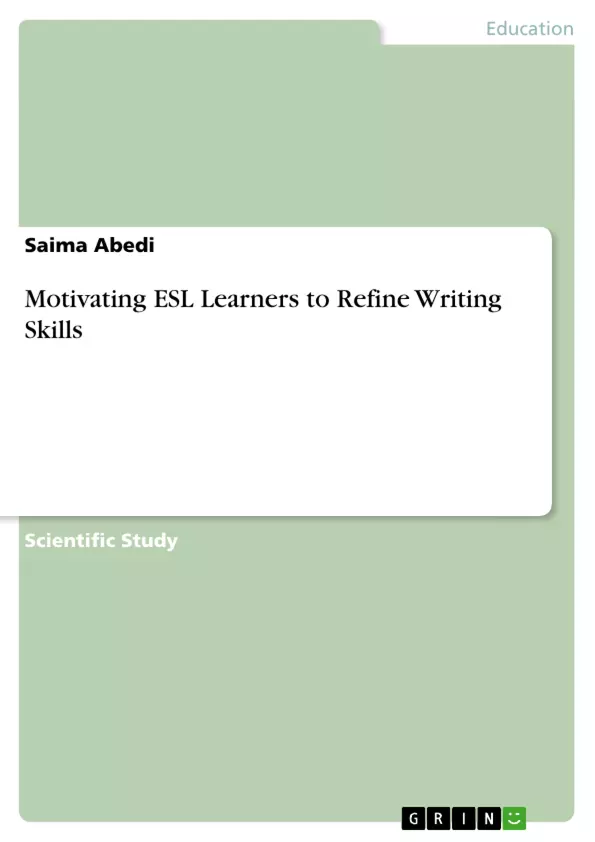Motivation is the basic factor for ESL students to excel in the writing class; therefore the role of the teachers is pivotal in writing process. Teachers have to work a lot to raise the level of motivation of the class and sustain it throughout the lesson, as motivated learners work with more interest and intensity. This initiative of teachers and learners can lead to enhancement of writing skills.
Inhaltsverzeichnis (Table of Contents)
- Abstract
- Introduction
- Research
- Discussion
- Suggestions
- Use of Prompts
- Background Music (BGM)
- Real Purpose for Writing
- Modelling
- Safe Journaling
- Collaboration
Zielsetzung und Themenschwerpunkte (Objectives and Key Themes)
This paper explores the importance of motivation in improving the writing skills of English as a Second Language (ESL) learners. The paper examines the challenges faced by ESL students in writing and proposes strategies that teachers can use to foster writing motivation.- The impact of motivation on ESL writing skills.
- Challenges faced by ESL students in writing, such as writer's block, lack of planning, and limited vocabulary.
- Strategies for fostering writing motivation, including the use of prompts, background music, real-world writing purposes, modeling, safe journaling, and collaborative learning.
- The benefits of incorporating these strategies in the ESL writing classroom.
- The role of teachers in fostering motivation and creating a conducive learning environment.
Zusammenfassung der Kapitel (Chapter Summaries)
- **Abstract:** This section introduces the paper's focus on the significance of motivation for ESL students' writing success, highlighting the role of teachers in fostering and sustaining motivation throughout the writing process.
- **Introduction:** The paper defines motivation, explores its importance in language acquisition, and outlines its specific relevance for ESL learners' writing abilities. It introduces the paper's aim to address the challenges faced by ESL students in writing and proposes strategies for motivating them.
- **Research:** This chapter details the results of a survey conducted among 30 ESL learners aged 12-16. The survey revealed that a majority of these learners face challenges in planning, idea generation, finding appropriate vocabulary, maintaining flow, and achieving accuracy in their writing. The analysis also identified preferences for independent work, and the need for more diverse interaction types.
- **Discussion:** This section analyzes the findings of the research, discussing the reasons behind ESL learners' reluctance to write and lack of improvement in writing skills. It highlights factors such as lack of planning, writer's block, limited reading and writing practice, and the impact of monotonous teaching methods.
- **Suggestions:** This chapter presents a series of strategies for fostering writing motivation in ESL learners. These include incorporating prompts, using background music, creating real-world writing purposes, employing modeling techniques, encouraging safe journaling, and promoting collaboration.
Schlüsselwörter (Keywords)
This paper focuses on the relationship between motivation and writing skills in ESL learners. The key themes include ESL writing, motivation, teaching strategies, writing prompts, background music, real-world writing, modeling, safe journaling, collaboration, and teacher's role. The paper explores the challenges faced by ESL learners in writing and offers practical suggestions for teachers to enhance writing motivation in the classroom.Frequently Asked Questions
Why is motivation crucial for ESL writing?
Motivation is the basic factor for students to excel; motivated learners work with more intensity and interest, which directly leads to better writing skills.
What are common challenges for ESL students in writing?
Common issues include writer's block, difficulty in planning, limited vocabulary, and a lack of flow or accuracy in their texts.
How can background music (BGM) help in a writing class?
BGM can create a more relaxed environment, reduce anxiety, and help students focus better on their creative writing tasks.
What is "Safe Journaling"?
It is a practice where students write without being graded on grammar or spelling, allowing them to express ideas freely and build confidence in their writing ability.
How does collaboration improve writing skills?
Collaborative learning allows students to share ideas, peer-edit, and learn from each other's strengths, making the writing process less intimidating.
- Quote paper
- Saima Abedi (Author), 2013, Motivating ESL Learners to Refine Writing Skills, Munich, GRIN Verlag, https://www.grin.com/document/208234



